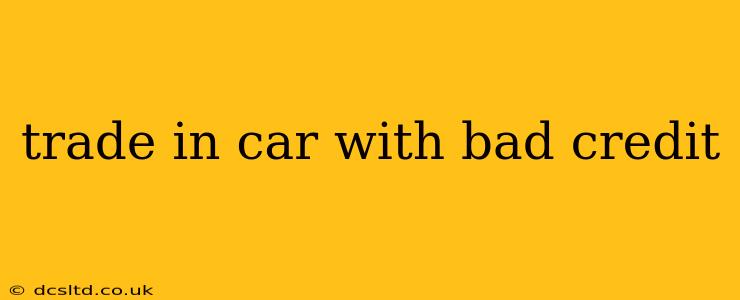Trading in a car when you have bad credit can feel daunting, but it's not impossible. Many dealerships and private buyers are willing to work with individuals facing credit challenges. This guide will equip you with the knowledge and strategies to successfully trade in your vehicle, even with less-than-perfect credit.
What Happens When You Trade in a Car with Bad Credit?
The process of trading in a car with bad credit is similar to trading with good credit, but with some key differences. The dealership will appraise your vehicle's value based on its make, model, year, mileage, condition, and market demand. However, your credit score will influence the terms of your new car loan. A lower credit score typically results in higher interest rates and potentially stricter loan requirements. The dealership might also offer less for your trade-in than they would for someone with excellent credit.
How to Maximize Your Trade-In Value with Bad Credit?
Despite the challenges, you can take steps to maximize the value of your trade-in:
- Improve Your Car's Condition: A well-maintained vehicle will fetch a higher price. Address any minor repairs, clean the interior thoroughly, and detail the exterior. A pristine car is more attractive to buyers, regardless of the owner's credit history.
- Research Your Car's Value: Use online resources like Kelley Blue Book (KBB) and Edmunds to determine a fair market value for your vehicle. This will help you negotiate effectively with the dealership.
- Shop Around: Don't settle for the first offer you receive. Compare offers from multiple dealerships to find the best deal. Remember, some dealerships specialize in working with customers who have bad credit.
- Negotiate Aggressively (But Respectfully): Be prepared to negotiate the price of your trade-in and the terms of your new car loan. Remember that you have leverage—you're offering a vehicle in exchange for a new purchase.
Can I Trade in a Car with a Loan?
Yes, you can trade in a car with an outstanding loan, but it's crucial to understand the implications. The dealership will calculate the payoff amount of your current loan and subtract it from your trade-in value. If you owe more than your car is worth (being "underwater" on your loan), you'll likely need to cover the difference. This is called negative equity and can significantly impact your ability to secure a new loan.
What if I Have Negative Equity?
Negative equity is a common challenge for those with bad credit. To mitigate this, consider the following:
- Make extra payments: Reducing your loan balance before trading in will lessen the negative equity and improve your negotiation position.
- Explore refinancing options: Refinancing your current loan might reduce your monthly payments and shorten the loan term, thereby reducing the amount of negative equity.
- Consider a longer loan term (with caution): A longer loan term will reduce monthly payments but will increase the overall interest paid. This is a last resort and should be approached cautiously, ensuring you can afford the extended payment schedule.
How Can I Improve My Credit Score Before Trading?
Improving your credit score before trading in your car can significantly improve your chances of securing a favorable deal. Consider these steps:
- Pay your bills on time: Consistent on-time payments are crucial for building credit.
- Keep your credit utilization low: Aim to use less than 30% of your available credit.
- Address any errors on your credit report: Dispute any inaccuracies you find on your credit reports from the three major credit bureaus (Equifax, Experian, and TransUnion).
- Consider a secured credit card: A secured credit card can help rebuild your credit history if used responsibly.
What Documents Do I Need to Trade in a Car with Bad Credit?
Typically, you'll need the following documents:
- Vehicle title: This proves ownership of the car you're trading in.
- Loan payoff information (if applicable): This shows the outstanding balance on your car loan.
- Driver's license: Your valid driver's license is required for identification purposes.
- Proof of insurance: Proof that your current vehicle is insured.
- Proof of income and residence: This helps demonstrate your ability to repay a new loan.
Trading in a car with bad credit requires careful planning and negotiation. By understanding the process and taking proactive steps, you can increase your chances of a successful trade-in and securing a new vehicle. Remember to shop around, compare offers, and be prepared to negotiate to get the best possible deal.
